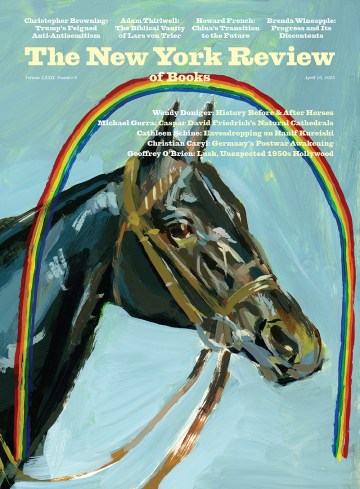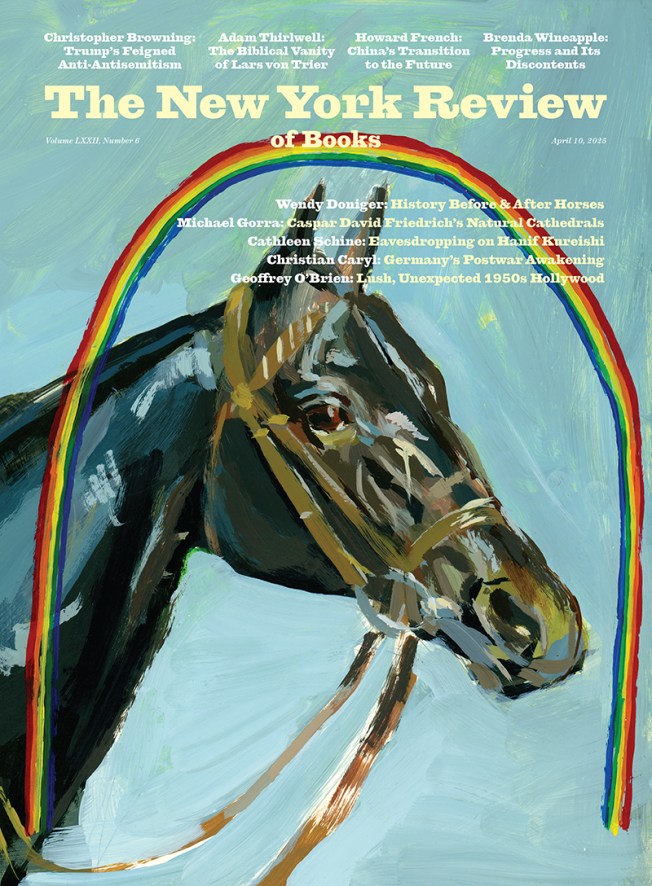This article is part of a regular series of conversations with the Review’s contributors; read past entries here and sign up for our e-mail newsletter to get them delivered to your inbox each week.
“If you wanted to calculate the trajectory of a cue ball coming off an object ball and then a cushion using Newtonian physics, you’d need an accurate measurement of every variable, some pretty complex differential equations, and a lot of calculating time,” writes Sally Rooney in the Review’s March 27 issue, channeling perhaps her inner Donald Duck. But for the best billiards players, like the snooker great Ronnie O’Sullivan, complex computation seems to pass without effort: “O’Sullivan lines up that shot and plays it in the space of about six seconds. A lucky guess? It would be lucky to make a guess like that once in a lifetime. He’s been doing this sort of thing for thirty years. What then?” asks Rooney. “If he’s not calculating, and he’s not guessing, what is Ronnie O’Sullivan doing?” What, her essay elaborates, is the nature of athletic genius?
A native of County Mayo, Ireland, Rooney is the author of four novels and a half dozen short stories that often follow the trajectories of people caroming around Dublin, and her essays have appeared in the London Review of Books, The New Yorker, and The Dublin Review. Last week I e-mailed her to ask about the pleasures of snooker, the differences between writing fiction and nonfiction, and the state of the far right in Ireland.
Daniel Drake: How and when did you first get into snooker? Do you play?
Sally Rooney: Snooker was very much in the cultural atmosphere when I was growing up in the west of Ireland in the 1990s. My grandmother was a fan, and my parents would watch it now and then. So the world of snooker, at least as a televisual phenomenon, has always been familiar to me.
It was during the pandemic that I got really into watching vintage snooker clips online. I suppose it started with clickbait sort of stuff—“Top 10 Craziest Shots” or whatever. But very quickly I began to find those compilation videos unsatisfying. I needed to see the entire frame, uncut, and preferably the entire match. In the years since, I’ve spent many hours watching old matches wherever I can find them. But I tend to watch them one frame at a time, so a whole match takes days or weeks to finish.
I have the impression—and of course this may be personal bias talking—that snooker is not as dependent on suspense as other sports are. Football fans will watch highlight reels after the outcome of a game is already known, of course, but few of them would watch an entire match that way. When I began watching old snooker games online, I almost always knew the outcome in advance, and it didn’t take away from my enjoyment at all. In fact, when I started watching live snooker a couple of years ago, I found the suspense absolutely unbearable! (I still sometimes switch off live snooker because I can’t stand to watch it.)
My sense of the game as an intellectual puzzle might well originate from my habit of watching old matches with foregone outcomes. In a live setting, especially in a close-run game, the intellectual side of the viewing experience can take a back seat to the adrenaline. But to answer your second question: No! I do not play. In the interests of the essay, I did try to play once, just for completeness. But no, no, no—I do not play snooker, or any sport.
What about snooker do you think better illuminates the questions you explore in your essay—about athletic genius, about the mind–body connection, about thought and action—than other sports? Put another way, why snooker?
For me, there are two relevant details that distinguish snooker from most other sports and games in this respect: the question of time in gameplay and what you might call aesthetic excess. I explore the issue of time a little in the essay, but in short, there are no strict time limits in snooker, and timing does not determine outcome. Take the shot now or in thirty seconds or two minutes—it doesn’t matter. That allowed me to get beyond the idea of “reflex,” which might have bogged me down a bit if I had been writing about another sport.
I also mention that frames of snooker are expected to continue even after competitive play has concluded. Players don’t just get to a certain number of points and then stop because they’ve won the frame; they continue until the break imposes its own conclusion. There’s something so strange and excessive about that—it seems to belong to the realm of aesthetics rather than sport.
But I can’t in good conscience account for my interest in snooker without mentioning the central figure of the essay. It’s just so much fun to watch Ronnie O’Sullivan play. That was the real starting point for me.
Advertisement
In your experiences as a writer, as a debater, or in other hobbies and vocations, do you think you’ve encountered some version of these questions, or are they in a way confined to the domain of sports? I have, for example, had the experience of writing a sentence and being mostly unable to account for its creation, and there are plenty of stories of artists who talk about their sense of themselves as being but a channel for some kind of divine inspiration that bypasses conscious thought, yet I wonder if you are trying to get at a more physical expression. Indeed, if that’s the case, what might distinguish “physical” genius from “mental” genius?
I’m not sure there is a cognitive distinction, as such. Of course, the genius of an athlete is different from that of a poet—because an athlete is trying to succeed according to definite criteria, whereas a poet has to invent their own criteria, in a way. The tasks are different. But that doesn’t mean the cognitive processes involved (or the subjective experiences of those processes) are dissimilar.
I can absolutely relate to what you’re saying about writing a sentence and then not quite knowing how to account for it. The fact is, we simply don’t know how the human mind works. And in the end, the question is probably more philosophical than scientific. I take on quite an extreme test case in the essay, someone whose gifts are widely acknowledged to be matchless, but by the end of the writing process I could see that a lot of the same questions applied to cognition in general.
My friend John Patrick McHugh read a draft of the essay for me, and he pointed out that O’Sullivan’s description of the snooker lifestyle—you’re alone in a room for five or six hours every day, talking to no one, artificial light, no fresh air—is also an accurate description of the writer’s lifestyle. I had to laugh—I couldn’t believe that hadn’t occurred to me! But I guess it was there subconsciously.
It might be fair to say that, although I don’t play myself, I identify with snooker players more than I do with other sportspeople. I once wrote an essay about my time as a college debater, and the title was a quote from a film about eight-ball pool—one of my favorite films, Robert Rossen’s The Hustler. That essay was published about ten years ago, so my sense of identification with pool and snooker players has obviously been there all along. As Wilde says, “The highest as the lowest form of criticism is a mode of autobiography.” (Whether I’m working in the highest or lowest mode is, of course, not for me to say.)
Do you approach writing criticism and nonfiction differently from novels and short stories? Does your process change?
I do find the process of writing nonfiction very different from the process of writing novels. When I write fiction, although I am completely immersed in my work, a lot of the time it’s a sort of slow meandering immersion—it often feels more like listening and sensing than outright activity. I’m happy to dwell in the world of my characters, to follow them around and get to know them, for fairly long periods, without necessarily advancing the story much.
With nonfiction, the immersion is more acute and can actually feel a bit like having a headache. I work very quickly and intensely, but then I often delete large sections too. And I go down rabbit holes of research, where I lose track of time and it’s suddenly dark outside. Broadly speaking, writing fiction makes me feel more attuned to the world, and writing nonfiction sometimes makes me forget its existence.
So it’s probably not surprising that so far I have mostly worked in the realm of fiction. I am quite attached to my own sanity, such as it is, and I feel I have to approach the essay form with caution. In fact, I wonder if nonfiction somehow taps into my (otherwise largely suppressed) competitive instincts. I never feel competitive when I’m writing fiction, obviously—I don’t see how fiction even could engage that feeling. But I do seem to feel a little inkling of that instinct when I write nonfiction. It’s something I can’t quite explain.
Forgive me, but I feel obliged to ask about current events. What is your sense of the direction of Irish politics? No party quite like Alternative for Germany or the Trump Republicans has yet gained a major following in Ireland, but the current governing coalition—two center-right parties and a clutch of conservative independents—does seem to at the very least want to continue with “market-based” economic policies, and meanwhile there is, as throughout “the West,” a burgeoning nativist movement. At the same time, Irish politicians and citizens have been quite vocal in their support of the Palestinian cause, and Ireland is one of the few democracies that instituted gay marriage and abortion rights with a popular vote. Do you think the current governing coalition will start making inroads with the far right? Were the 2023 riots in Dublin a sign of things to come?
Advertisement
I think you’ve summarized the situation very well. The far right have had little electoral success in Ireland so far, but they are certainly growing in organizational power. Aside from the Dublin riots—and in a sense more significantly—we have seen a wave of arson attacks on refugee accommodation centers and properties earmarked for that purpose. Those attacks grab fewer headlines, but I find them much more disturbing.
The electoral democratic framework encourages us to conceive of political power in terms of numbers, but as we all know, a small group of committed extremists can become very powerful indeed without any significant electoral presence. A tiny minority of far-right radicals has arguably managed to set the public agenda on immigration in Ireland more than any mainstream political party. (Though, as you note, they have had far less success in undermining public solidarity with Palestine, or support for marriage equality and abortion access.)
What we lack at the moment is any countervailing presence on the left, which remains largely wedded to electoral politics and peaceful, nondisruptive tactics like protest marches. And of course, that goes for me too—I also vote and attend protests and write occasional little left-wing polemics. But I am increasingly concerned that that’s not really a sufficient strategy when our enemies are willing to burn down buildings to make their presence felt.
There is also a broader unanswered question here: Why is all this happening now? I don’t mean in any way to excuse or rationalize far-right beliefs, but it isn’t enough to say that some people are just naturally attracted to fascism. If that were the case, the far right would be a constant presence, never particularly increasing or diminishing in popularity. Whereas in reality, it is obviously in the ascendant at this particular historical juncture, and indeed has taken power in many places, the US included.
I am woefully unqualified to explain why that is. From a Marxist perspective, I have to suspect that the answer lies with changes in the relations between the working and capitalist classes since, I imagine, the end of the cold war. Nation-state capitalism—itself a relatively new political formation—may just be doomed to cyclically recreate the conditions for fascism to thrive. And of course, it also seems doomed to overheat the planet and kill us all. . . So we should probably do something about that.
What are some of the best novels you’ve read, old or new, in the last few years?
I have to admit that I spend most of my reading time on old novels, and my contemporary reading is very disorganized, so I’m sure I’m missing out on a lot of great books. But I do have to mention the work of Annie Ernaux. Of course, the word “novel” isn’t always a perfect fit for her books, but I still want to say how much I love and admire, among many others, The Years, translated by Alison L. Strayer, and Exteriors and A Man’s Place, both translated by Tanya Leslie.
All of Sheila Heti’s books and stories have a special place in my life. Her Alphabetical Diaries—again, maybe not a novel as such—is a book that I cherish and that has meant a lot to me. Isabella Hammad’s Enter Ghost and Chetna Maroo’s Western Lane are two more contemporary novels I hold dear. And the aforementioned John Patrick McHugh has a wonderful book coming out this year called Fun and Games.
As for old novels, I’m presently halfway through John E. Woods’s translation of Thomas Mann’s The Magic Mountain, and I’m having the time of my life! It is such a funny and delightful book (so far). Last year, I read Dostoevsky’s Demons for the first time, in the Pevear and Volokhonsky translation, and found it almost unbearably moving. I also read a lot of Georges Simenon’s Inspector Maigret novels. Probably too many. I thought it might help me to improve my meager French if I started trying to read them in the original, but I think it has just equipped me with a lot of police terminology I will hopefully never have any reason to use.



